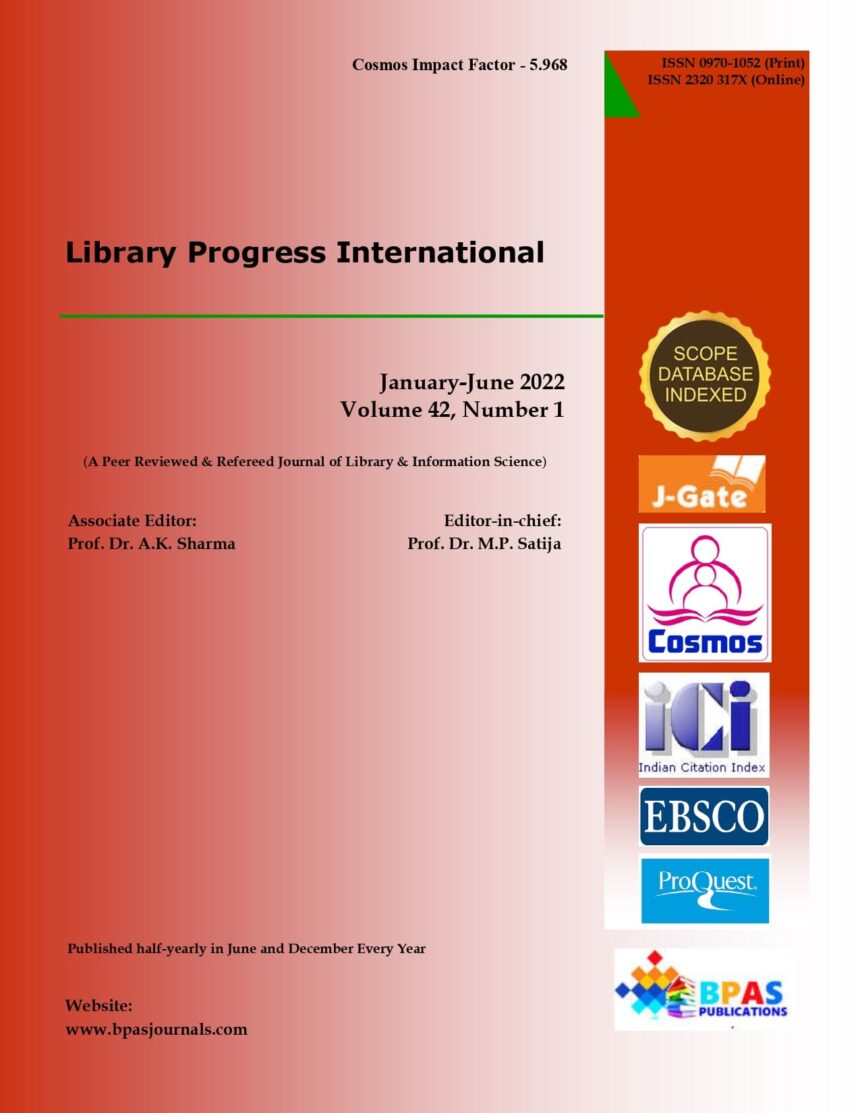A Study on Job Satisfaction among Women LIS Professionals of India
DOI:
https://doi.org/10.48165/Keywords:
Job Satisfaction, LIS Professionals-India, LIS Professionals-WomenAbstract
Job satisfaction is one of the most critical factors which provides shape and growth to any organisation. Job satisfaction is a personal feeling of an individual or a state of mind regarding the nature of work. Library professionals play a vital role in the higher education sector in disseminating information to the information seekers. Various factors come under job satisfaction, e.g., nature of work, degree, promotion, and quality of the physical environment in which people work. Job satisfaction plays a vital role in everyone's life in achieving organisational goals. The purpose of the study was to measure the job satisfaction level among Women LIS Professionals in India. The study was carried out because of knowing Job Satisfaction levels among Women LIS Professionals, and many significant findings have emerged. They have opened a new area in the field of job satisfaction levels. The online questionnaire was sent among women LIS professionals across India through Facebook, WhatsApp, Telegram and E-mail. The questionnaire was designed keeping in view the study's objective consisting of closed-ended questions. A total of 146 responses were collected and analysed. The result shows that the Women LIS Professionals were slightly satisfied with their job. Many women LIS Professionals were dissatisfied with their promotion salaries.
Downloads
References
Al-Ismail, S., Carmichael, F., & Duberley, J. (2019). Female employment in hotels in Saudi Arabia and UAE. Gender in Management: An International Journal, 34(7), 554-576. https://doi.org/10.1108/gm-11- 2017-0151
Bourke, R. J. (1995). Incidence and consequences of sexual harassment in a professional services firm. Employee Counselling Today, 7(3), 23- 29. https://doi.org/10.1108/136656295100
C. Esakkimuthu, C., & Vellaichamy, A. (2015). Job Satisfaction among the Library Professionals in Engineering Institution: An Empirical Study. International Journal of Digital Library Services, 5(1), 22-37.
Deodhar, M., & Powdwal, S. (2017). Impact of continuing education programs (CEPs) on LIS professionals in academic libraries in Mumbai, India. Library Management, 38(2/3), 117- 130. https://doi.org/10.1108/lm-07-2016-
Desai, M., Majumdar, B., Chakraborty, T., & Ghosh, K. (2011). The second shift: Working women in India. Gender in Management: An International Journal, 26(6), 432-
https://doi.org/10.1108/17542411111 164920
Dias, D., Leite, ., Ramires, A., & Bicho, P. (2017). Working with cancer: Motivation and job satisfaction. International Journal of Organizational Analysis, 25(4), 662- 686. https://doi.org/10.1108/ijoa-12-2016-
Ebrahim, Z. B., Mustapa, M. K., Mustakim, N. A., Mokhtar, N., & Sauid, M. K. (2018). The Influence of Workplace Support on Job Satisfaction among Academic Staff in Five Malaysian Public Research Universities. Proceedings of the Regional Conference on Science, Technology and Social Sciences (RCSTSS 2016). Singapore: Springer.
Ezzat, A., & Ehab, M. (2019). The determinants of job satisfaction in the Egyptian labour market. Review of Economics and Political Science, 4(1), 54- 72. https://doi.org/10.1108/reps-10-2018-
Fatima, H. Z., & Bhatti, R. (2014). Job satisfaction among LIS professionals of universities of Punjab Province. Pakistan Journal of Information Management and Libraries, 15(1), 30-36.
Jabeen, F., Faisal, M. N., & Katsioloudes, M. (2018). Localisation in an emerging Gulf economy. Equality, Diversity and Inclusion: An International Journal, 37(2), 151- 166. https://doi.org/10.1108/edi-02-2017-
Jayaraj, W. J. (2017). Job satisfaction level of teacher librarians of national schools in Batticaloa district of Sri Lanka. Journal of Research in Humanities and Social Science, 5(6), 34-41.
Jilke, S. (2015). Job satisfaction and regime change: Evidence from a natural experiment. International Public Management Journal. International Public Management Journal. Retrieved from http://ssrn.com/abstract=2573794
Khan, A., Masrek, M. M., & Nazdar, F. M. (2016). Emotional intelligence and job satisfaction of academic libraries: An Assessment of relationship. Journal of Librarianship and Information
Science. http://journals.sagepub.com/doi /metrics/10.1177/0961000616650733 14. Matijaš, M., Merkaš, M., & Brdovčak, B. (2018). Job resources and satisfaction across gender: The role of work-family conflict. Journal of Managerial Psychology, 33(4/5), 372- 385. https://doi.org/10.1108/jmp-09- 2017-0306.
Muhonen, T. (2016). Exploring Gender Harassment among university teachers and researchers. Journal of Applied Research in Higher Education, 8(1), 131- 142. https://doi.org/10.1108/jarhe-04-
-0026
Reed, S. A., Kratchman, S. H.,& Strawser, R. H. (1994). Job Satisfaction, organisational commitment, and turnover intentions of United States accountants. Accounting, Auditing &Accountability Journal, 7(1), 31- 58. https://doi.org/10.1108/095135794100
Tomlinson, J. (2007). Female part‐time workers' experiences of occupational mobility in the UK service industry. Women in Management Review, 22(4), 305- 318. https://doi.org/10.1108/09649420710
Yee, L. C. (2018). An Analysis on the relationship between job satisfaction and work performance among Academic staff in Malaysian private universities. Journal of Arts & Social Sciences, 1(2), 64-73.
G., & I. Sinde-Cantorna, A. (2014). Self employment and job satisfaction: An empirical analysis. International Journal of Manpower, 35(5), 688- 702. https://doi.org/10.1108/ijm-11-2012- 0169

